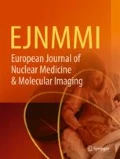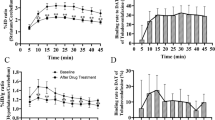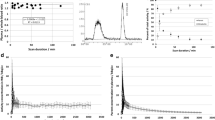Abstract
Purpose
The dopamine transporter (DAT) is a plasma membrane protein of central interest in the pathophysiology of neuropsychiatric disorders and is known to be a target for psychostimulant drugs. [11C]PE2I is a new radioligand which binds selectively and with moderate affinity to central DAT, as has been demonstrated in vitro by autoradiography and in vivo by positron emission tomography (PET). The aims of the present PET study were to quantify regional [11C]PE2I binding to DAT in the human brain and to compare quantitative methods with regard to suitability for applied clinical studies.
Methods
One PET measurement was performed in each of eight healthy male subjects. The binding potential (BP) values were obtained by applying kinetic compartment analysis, which uses the metabolite-corrected arterial plasma curve as an input function. They were compared with the BP values quantified by two reference tissue approaches, using cerebellum as a reference region representing free and non-specific radioligand binding.
Results
The radioactivity concentration was highest in the striatum, lower in the midbrain and very low in the cerebellum. The regional [11C]PE2I binding could be interpreted by kinetic compartment models. However, the BP values in the striatum obtained by the compartment analyses were about 30% higher than the BP values obtained using reference tissue methods. We suggest that the difference may be explained by the inaccurate metabolite correction, small amounts of radioactive metabolites that could account for the presence of non-specific binding in the cerebellum and insufficient data acquisition time.
Conclusion
The reference methods may be used to quantify [11C]PE2I binding in clinical studies, assuming that non-specific binding in the cerebellum does not vary between subjects and that an extended data acquisition time is employed. Moreover, the study corroborates the previous observation that [11C]PE2I is advantageous for PET examination of DAT binding in the midbrain, a region from which dopaminergic innervation originates and which is of central interest for the pathophysiology of several neuropsychiatric disorders.








Similar content being viewed by others
References
Gulley JM, Zahniser NR. Rapid regulation of dopamine transporter function by substrates, blockers and presynaptic receptor ligands. Eur J Pharmacol 2003;31(479):139–152
Antonini A, Moresco RM, Gobbo C, De Notaris R, Panzacchi A, Barone P, et al. The status of dopamine nerve terminals in Parkinson's disease and essential tremor: a PET study with the tracer [11-C]FE-CIT. Neurol Sci 2000;22:47–48
Ginovart N, Lundin A, Farde L, Halldin C, Backman L, Swahn CG, et al. PET study of the pre- and post-synaptic dopaminergic markers for the neurodegenerative process in Huntington’s disease. Brain 1997;120:503–514
Laakso A, Bergman J, Haaparanta M, Vilkman H, Solin O, Syvalahti E, et al. Decreased striatal dopamine transporter binding in vivo in chronic schizophrenia. Schizophr Res 2001;52:115–120
Dresel S, Krause J, Krause K-H, LaFougere C, Brinkbäumer K, Kung HF, et al. Attention deficit hyperactivity disorder: binding of [99mTc]TRODAT-1 to the dopamine transporter before and after methylphenidate treatment. Eur J Nucl Med 2000;27:1518–1524
Jucaite A, Fernell E, Halldin C, Forssberg H, Farde L. Reduced midbrain dopamine transporter binding in male adolescents with ADHD; association between striatal dopamine markers and motor hyperactivity. Biol Psychiatry 2005;57(3):229–238
Volkow ND, Wang GJ, Fowler JS, Logan J, Francheschi D, Maynard L, et al. Relationship between blockade of dopamine transporters by oral methylphenidate and increase in the extracellular dopamine: therapeutic implications. Synapse 2002;43:181–187
Emond P, Garreau L, Chalon S, Boazi M, Caillet M, Bricard J, et al. Synthesis and ligand binding of nortropane derivatives: N-substituted-2-carbomethoxy-3-(4’-iodophenyl)nortropane and N-(3-iodoprop-2E-enyl)-2-carbomethoxy-3-(3’,4’-disubstituted phenyl)nortropane. New affinity and selectivity compounds for the dopamine transporter. J Med Chem 1997;40:1366-1372
Hall H, Halldin C, Guilloteau D, Chalon S, Emond P, Besnard J, et al. Visualization of the dopamine transporter in the human brain postmortem with the new selective ligand [125I]PE2I. Neuroimage 1999;9:108–116
Halldin C, Erixon-Lindroth N, Pauli S, Chou YH, Okubo Y, Karlsson P, et al. [11C]PE2I—a highly selective radioligand for PET-examination of the dopamine transporter in monkey and human brain. Eur J Nucl Med Mol Imaging 2003;30:1220–1230
Frost JJ, Douglass KH, Mayberg HS, Dannals RF, Links JM, Wilson AA, et al. Multicompartmental analysis of [11C]-carfentanil binding to opiate receptors in humans measured by positron emission tomography. J Cereb Blood Flow Metab 1989;9:398–409
Wong D, Gjedde A, Wagner H Jr. Quantification of neuroreceptors in the living human brain. I. Irreversible binding of ligands. J Cereb Blood Flow Metab 1986;6:137–146
Mintun M, Raichle M, Kilbourn M, Wooten G, Welch M. A quantitative model for the in vivo assessment of drug binding sites with positron emission tomography. Ann Neurol 1984;15:217–227
Huang S, Barrio J, Phelps M. Neuroreceptor assay with positron emission tomography. Equilibrium versus dynamic approaches. J Cereb Blood Flow Metab 1986;6:515–521
Caceci MS, Cacheris WP. Fitting curves to data, the Simplex algorithm in the answer. BYTE 1984;9:340–362
Perlmutter JS, Larson KB, Raichle ME, Markham J, Mintun MA, Kilbourn MR, et al. Strategies for in vivo measurement of receptor binding using positron emission tomography. J Cereb Blood Flow Metab 1986;6:154–169
Farde L, Eriksson L, Blomquist G, Halldin C. Kinetic analysis of central [11C]raclopride binding to D2-dopamine receptors studied by PET—a comparison to the equilibrium analysis. J Cereb Blood Flow Metab 1989;9:696–708
Koeppe RA, Holthoff VA, Frey KA, Kilbourn MR, Kuhl DE. Compartmental analysis of [11C]flumazenil kinetics for the estimation of ligand transport rate and receptor distribution using positron emission tomography. J Cereb Blood Flow Metab 1991;11:735–744
Delforge J, Pappata S, Millet P, Samson Y, Bendriem B, Jobert A, Crouzel C, Syrota A. Quantification of benzodiazepine receptors in human brain using PET, [11C]flumazenil, and a single-experiment protocol. J Cereb Blood Flow Metab 1995;15:284–300
Farde L, Ito H, Swahn CG, Pike VW, Halldin C. Quantitative analyses of carbonyl-carbon-11-WAY-100635 binding to central 5-hydroxytryptamine-1A receptors in man. J Nucl Med 1998;39:1965–1971
Lammerstma AA, Bench CJ, Hume SP, Osman S, Gunn K, Brooks DJ, et al. Comparison of methods for analysis of clinical [11C]raclopride studies. J Cereb Blood Flow Metab 1996;16:42–52
Akaike H. A new look at the statistical model identification. IEEE Trans Automat Contr 1974;19:716–723
Schwartz G. Estimating the dimension of a model. Ann Stat 1978;6:461–564
Hawkins R, Phelps M, Huand S-C. Effects of temporal sampling, glucose metabolic rates, and disruptions of the blood-brain barrier on the FDG model with and without a vascular compartment. Studies in human brain tumours with PET. J Cereb Blood Flow Metab 1986;6:170–183
Logan J, Fowler JS, Volkow ND, Wolf AP, Dewey SL, Schyler DJ, et al. Graphical analysis of reversible radioligand binding from time-activity measurements applied to [N-11C-methyl]-(-)-cocaine PET studies in human subjects. J Cereb Blood Flow Metab 1990;10:740–747
Lammertsma AA, Hume SP. Simplified reference tissue model for PET receptor studies. Neuroimage 1996;4:153–155
Bergström M, Boëthius J, Eriksson L, Greitz T, Ribbe T, Widen L. Head fixation device for reproducible position alignment in transmission CT and positron emission tomography. J Comput Assist Tomogr 1981;5:136–141
Wienhard K, Dahlbom M, Eriksson L, Michel C, Bruckbauer T, Pietrzyk U, et al. The ECAT EXACT HR: performance of a new high resolution positron scanner. J Comput Assist Tomogr 1994;18:108–110
Eriksson L, Holte S, Bohm C, Kesselberg M, Hovander B. Automated blood sampling systems for positron emission tomography. IEEE Trans Nucl Sci 1988;35:703–707
Drebin RA, Carpenter L, Hanrahan P. Volume rendering. Comput Graph 1988;22:65–74
Toga AW. Three dimentional neuro imaging. New York: Raven Press; 1990
Pauli S, Sedvall G. Three-dimensional visualization of the benzodiazepine receptor population within a living human brain using PET and MRI. Eur Arch Psychiatry Clin Neurosci 1997;247:61–70
Olsson H, Halldin C, Farde L. Differentiation of extrastriatal dopamine D2 receptor density and affinity in the human brain using PET. NeuroImage 2004;22:794–803
Tupala E, Kuikka JT, Hall H, Bergstrom K, Sarkioja T, Rasanen P, et al. Measurement of the striatal dopamine transporter density and heterogeneity in type 1 alcoholics using human whole hemisphere autoradiography. Neuroimage 2001;14:87–94
Ciliax BJ, Drash GW, Staley JK, Haber S, Mobley CJ, Miller GW, et al. Immunocytochemical localization of the dopamine transporter in human brain. J Comp Neurol 1999;21(409):38–56
Halldin C, Gulyas B, Langer O, Farde L. Brain radioligands—state of art and new trends. Q J Nucl Med 2001;45:139–152
Laruelle M, Slifstein M, Huang Y. Positron emission tomography: imaging and quantification of neurotransporter availability. Methods 2002;27:287–299
Chalon S, Emond P, Garreau L, Frangin Y, Mauclaire L, Guilloteau D, et al. Characterisation of the cocaine derivative PE2I, a high specific marker for imaging the dopamine transporter by SPECT. Eur J Nucl Med 1997;24:880
Gu XH, Zong R, Kula NS, Baldessarini RJ, Neumeyer JL. Synthesis and biological evaluation of a series of novel N- or O-fluoroalkyl derivatives of tropane: potential positron emission tomography (PET) imaging agents for the dopamine transporter. Bioorg Med Chem Lett 2001;11:3049–3053
Lundkvist C, Halldin C, Ginovart N, Swahn CG, Farde L. [18F] beta-CIT-FP is superior to [11C] beta-CIT-FP for quantitation of the dopamine transporter. Nucl Med Biol 1997;24:621–627
Karlsson P, Sedvall G, Halldin C, Swahn CG, Farde L. Evaluation of SCH 39166 as PET ligand for central D1 dopamine receptor binding and occupancy in man. Psychopharmacology (Berl) 1995;121:300–308
Farde L, Hall H, Ehrin E, Sedvall G. Quantitative analysis of D2 dopamine receptor binding in the living human brain by PET. Science 1986;231(4735):258–261
Madras BK, Gracz LM, Fahey MA, Elmaleh D, Meltzer PC, Liang AY, et al. Altropane, a SPECT or PET imaging probe for dopamine neurons: III. Human dopamine transporter in postmortem normal and Parkinson's diseased brain. Synapse 1998;29:116–127
Hurley MJ, Mash DC, Jenner P. Markers for dopaminergic neurotransmission in the cerebellum in normal individuals and patients with Parkinson’s disease examined by RT-PCR. Eur J Neurosci 2003;18:2668–2672
Schollborn-Peyronneau M, Pruvost A, Kuhnast B, Coulon C, Ottaviani M, Emond P, et al. Metabolism of PE2I and 11C-PE2I, a high selective ligand for PET examination of the dopamine transporter. J Nucl Med 2005;346:347
Farde L, Hall H, Pauli S, Halldin C. Variability in D2-dopamine receptor density and affinity: a PET study with [11C]raclopride in man. Synapse 1995;10:200–208
Pinborg LH, Videbaek C, Svarer C, Yndgaard S, Paulson OB, Knudsen GM. Quantification of [123I]PE2I binding to dopamine transporters with SPET. Eur J Nucl Med Mol Imaging 2002;29:623–631
Olsson H, Halldin C, Swahn CG, Farde L. Quantification of [11C]FLB 457 binding to extrastriatal dopamine receptors in the human brain. J Cereb Blood Flow Metab 1999;19(10):1164–1173
Olsson H, Halldin C, Farde L. Differentiation of extrastriatal dopamine D2 receptor density and affinity in the human brain using PET. Neuroimage 2004;22(2):794–803
Slifstein M, Laruelle M. Effects of statistical noise on graphic analysis of PET neuroreceptor studies. J Nucl Med 2000;41:2083–2088
Moore RY. Organization of midbrain dopamine systems and the pathophysiology of Parkinson’s disease. Parkinsonism Relat Disord Suppl 2003;2:S65–S71
Poyot T, Conde F, Gregoire MC, Frouin V, Coulon C, Fuseau C, et al. Anatomic and biochemical correlates of the dopamine transporter ligand 11C-PE2I in normal and parkinsonian primates: comparison with 6-[18F]fluoro-L-dopa. J Cereb Blood Flow Metab 2001;21:782–792
Acknowledgements
This work was supported by grants from the Swedish Research Council (09114/15A). Aurelija Jucaite was sponsored by The Frimurare Barnhuset, Sunnerdahl Handikapp, Sällskapet Barnavård, Professor Bror Gardelius Memorial Foundation. The authors would like to thank the members of the Stockholm PET group, and in particular Kjerstin Lind and Arsalan Amir, for their participation in data acquisition and for their technical assistance.
Author information
Authors and Affiliations
Corresponding author
Rights and permissions
About this article
Cite this article
Jucaite, A., Odano, I., Olsson, H. et al. Quantitative analyses of regional [11C]PE2I binding to the dopamine transporter in the human brain: a PET study. Eur J Nucl Med Mol Imaging 33, 657–668 (2006). https://doi.org/10.1007/s00259-005-0027-9
Received:
Accepted:
Published:
Issue Date:
DOI: https://doi.org/10.1007/s00259-005-0027-9




